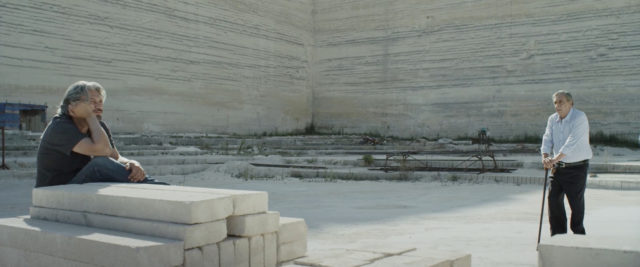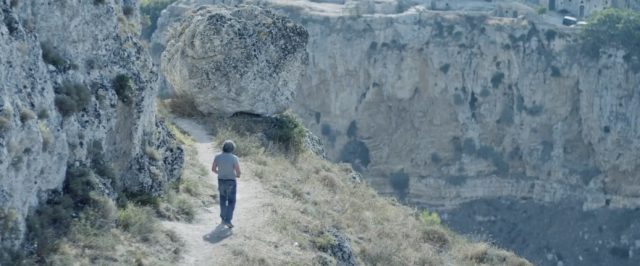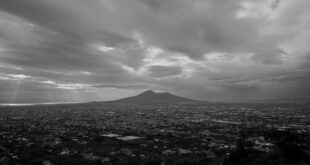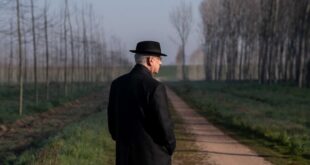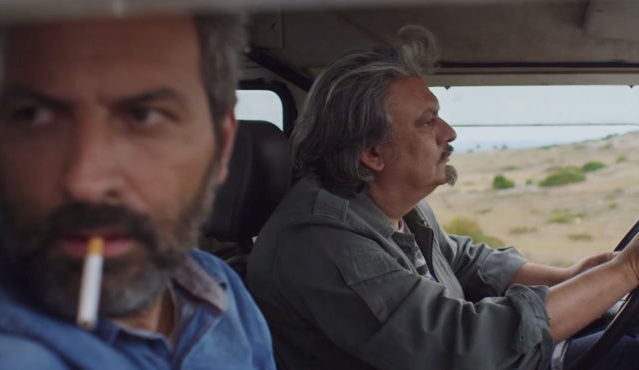
In our ongoing series “Basilicata: Terra di Cinema,” we are focusing today on a new film by two of Basilicata’s most prolific filmmakers: Antonio Andrisani and Pascal Zullino.
Since our series began in 2015, this issue of oil drilling has been present among the region’s contemporary filmmakers. So much so, that it would be disrespectful to the filmmakers to overlook it. Through their work, the directors express their concerns over the oil drilling, which began in the region in 1996. Nicknamed “Little Texas,” the drilling site in Basilicata produces a staggering 80,000 barrels a day. This production has led to profound environmental and health concerns throughout the region. The latest filmmakers to express those concerns through cinema are Antonio Andrisani and Pascal Zullino with their feature film “Il Vangelo secondo Mattei” (The Gospel According to St. Matthews). The story centers on an elderly man Franco Gravela (played by Flavio Bucci) who is offered one last shot at his dream of acting in cinema. Those making the offer are a couple of failed directors who also need to make this film in a last ditch effort to save their faces and careers. Most of the “film inside a film” takes place on the natural, magnificent set of the Sassi of Matera with shots of the surrounding countryside and landscape.
We caught up with the filmmakers and actor Flavio Bucci when they were filming in Matera in October of 2015. After recently seeing a press copy of the film, I traveled to Italy to interview Andrisani and Zullino. In both conversations, the filmmakers talked about the theme of petroleum as well as the dreams of the protagonist. My personal interpretation of the film, having watched it with English subtitles, is a story of second chances. I did not feel the theme of petroleum to be strong, but rather cleverly and artistically on the part of the filmmakers, presented as a metaphor. At one point, Bucci’s character turns down an offer to be bought out by a politician and that is where I can see the metaphor for the petroleum. Perhaps the filmmakers want to say, “You cannot put a price on our sacred land.”
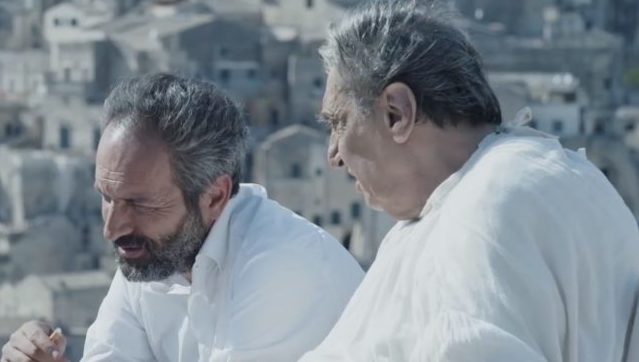
I met with Antonio Andrisani in the depths of the Sassi of Matera. We talked amidst children running up and down the never-ending stairs of the Sassi and the wide-eyed, awe-inspired tourists as they took in the enchantment of the spell-binding stone structures. During our conversation, Andrisani spoke of the influence of Pier Paolo Pasolini’s 1964 film “Il Vangelo Secondo Matteo” (The Gospel According to St. Matthew), which was also shot in the Sassi of Matera. He explained that at the time of Pasolini’s murder in November of 1975, he was working on a book titled “Petrolio” that was published posthumously in 1992 by the Giulio Einaudi publishing company. With that thought in mind, Andrisani and Zullino decided to pay tribute to Pasolini by calling the film “Il Vangelo secondo Mattei” (The Gospel According to St. Matthews). Pasolini’s lead actor Enrique Irazoqui also makes a guest appearance in Andrisani and Zullino’s film, a gesture which further validates the filmmakers’ appreciation of their city’s history in the realm of cinema.
Andrisani went on to explain what I also sensed in the film. Aside from the theme of petroleum, the story is about a man, an elderly man trying to realize his dream to work in cinema even if he seems to be out of time. Andrisani explained that he doesn’t want the film to be a journalistic report on oil drilling. Instead, he wants to make viewers aware of the problems rather than neglecting them and pretending they don’t exist. With this film, he wants to encourage people to develop a critical conscience about the issues in general that are important to him.
Prior to meeting with Antonio Andrisani in the Sassi of Matera, I caught up with Pascal Zullino in the seaside town of Maratea on the other side of Basilicata. There, he was presenting the trailer for the film at the Giornate del Cinema Lucano, an annual film festival which highlights projects by the new generation of filmmakers in Basilicata. I gave him my interpretation of the film being more of an ode to chasing a dream. He described it as having a “comedy tone, which tells a strong truth.” The film speaks to how prepared we are to defend the environment upon which we walk daily. He described it as a movie about the ransom of the world, a land that is in a continual cycle of exploitation and abuse. He went on to say, “The history of oil is an ancient history, but our thinking (in the film) is not focusing on the problem from the point-of-view of the damage it’s causing to the earth or the wealth it’s creating. Instead, how man has created the situation and what he should do now to defend the land he occupies.”
In communicating their message, Andrisani and Zullino created this film inside a film in which Bucci plays an aging Christ, a Christ that never died. Add two bickering directors, a nagging wife and a few clever cameos, and you get a highly entertaining, socially conscious contemporary masterpiece set against the ancient land and structures of the eternal region of Basilicata. In the end, it’s safe to say that regardless of which continent you’re living on, the world is in dire need of us inhabitants to, in Antonio Andrisani’s words, “develop a critical conscience about the issues.” Cinema is a powerful platform to communicate that message.
The film will premiere in Matera on October 26 at 9:00pm at the Cinema Teatro Duni. The following cast members along with both directors will be in attendance: Flavio Bucci, Andrea Osvárt, Antonio Stornaiolo, Riccardo Zinna and Marco Caldron.
There is currently a corresponding photo exhibit in Matera at the Museo Archeologico Nazionale Domenico Ridola, which features a collection of set photos by Antonio Sansone. Follow the film’s Facebook page (https://www.facebook.com/ilvangelosecondomattei/) for updates and future screenings. We’ll keep you updated on when the film will be available in North America.
 Fra Noi Embrace Your Inner Italian
Fra Noi Embrace Your Inner Italian


